The opposition castigates and questions the “rushed” nomination and approval of the Prime Minister and the Vice-president by the Parliament and Senate. The President of the National Assembly says everything was legal. There are two distinct positions.
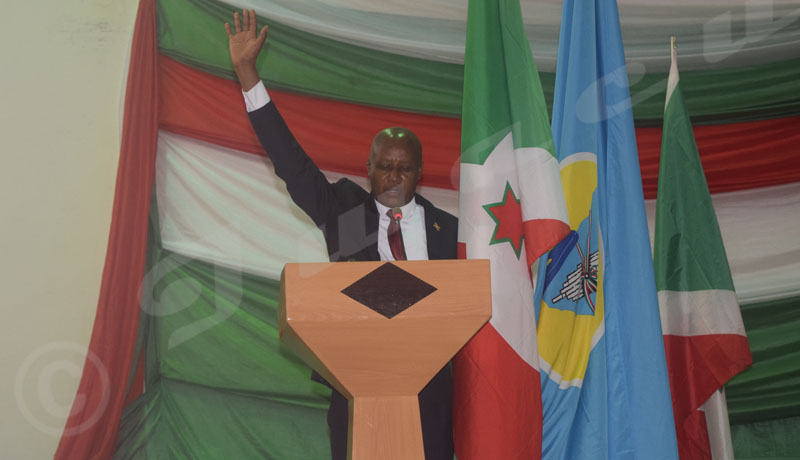
Vice President Prosper Bazombanza being sworn in
The National Assembly approved in a secret vote, this Tuesday, June 23, the current Public Security Minister Alain Guillaume Bunyoni as Prime Minister of the Republic of Burundi. 92 Mps voted for and 2 others voted against. They also approved as vice-president of the Republic, Prosper Bazombanza, with 91 votes for, 2 votes against and 1 abstention.
In the Senate, all the 39 senators also approved them unanimously.
This plenary session took place without the presence of MPs of the Amizero y’Abarundi Coalition, especially those of the National Congress for Liberty (CNL). According to the latter, this approval activity was hidden and improvised on the calendar of activities. “It is cheating, because the procedure is considered an important event for national life.”
“The appointment was not rushed”
The outgoing President of the National Assembly, Pascal Nyabenda, said that he had received a message the day before at 7 p.m. asking him to put on the agenda for this Tuesday the approval of the Vice-President of the Republic and the Prime Minister.
To those who consider that this approval has been “rushed”, the President of the National Assembly refers to Article 104 of the Constitution which stipulates that: “The mandate of the President of the Republic begins on the day of his swearing-in and ends when his successor takes office.”
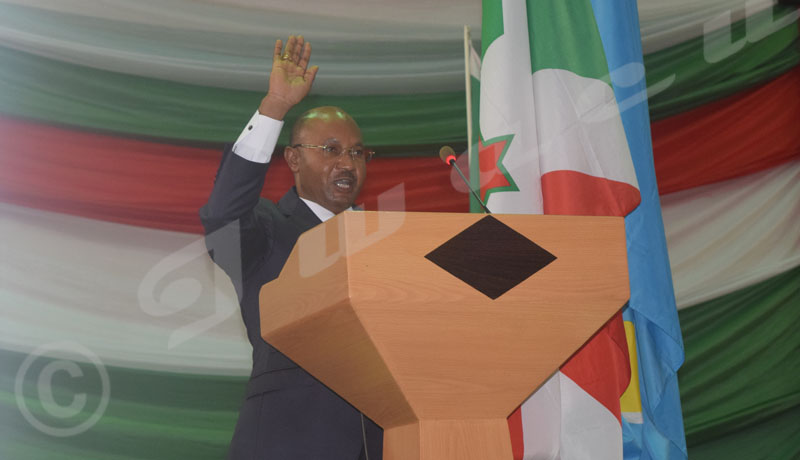
Prime Minister Alain Guillaume Bunyoni being sworn in
According to Mr. Nyabenda, this means that the new president has the full right to appoint his vice-president as well as the Prime Minister of the Republic.
“There is an elected institution that has not yet completed its mandate. In the new Constitution, there is no mention of the newly elected parliament. We are only talking about parliament.”
Committed to working for peace and justice for all
On Wednesday, May 24, and in the absence of MPs of CNL party including Agathon Rwasa, its president, Prosper Bazombanza and Alain Guillaume Bunyoni were sworn in.
In Kirundi, the national language, before Almighty God, before the President of the Republic of Burundi, before the National Assembly and the Senate (outgoing), General Bunyoni and Mr. Bazombanza swore loyalty to the Charter of National Unity, the Constitution, etc. They committed themselves to working for peace and justice for all Burundians, combating the ideologies of genocide and exclusion and defending and promoting human rights for all Burundians.
In his oath, Prosper Bazombanza, vice-president also emphasized that he would uphold the sovereignty of Burundi and its independence. He said so before signing before the Constitutional Court.
A family photo with President Evariste Ndayishimiye followed. The two were accompanied by their wives.
Reactions
“An improvised activity”
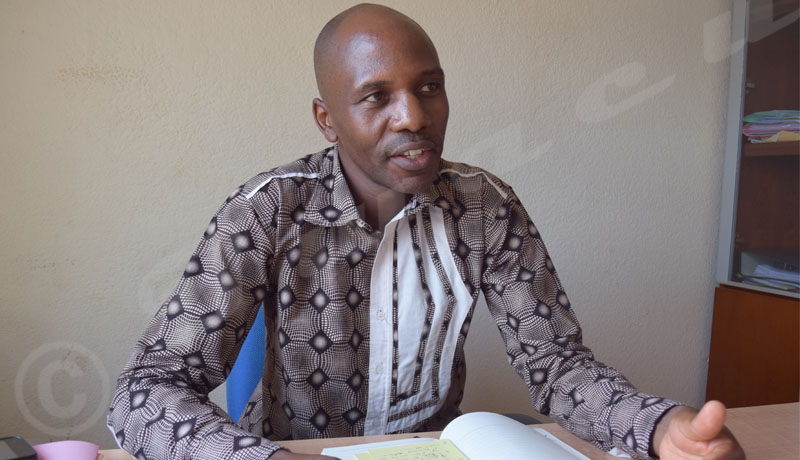 According to Térence Manirambona, spokesman for CNL party, the activity of approving the Prime Minister and the Vice-President was not on the agenda for Tuesday. “It’s an improvised activity because until Monday evening, when the office held its meeting, it was not specified that this activity would take place.”
According to Térence Manirambona, spokesman for CNL party, the activity of approving the Prime Minister and the Vice-President was not on the agenda for Tuesday. “It’s an improvised activity because until Monday evening, when the office held its meeting, it was not specified that this activity would take place.”
For him, it is surprising that such an important activity takes place in secret.“ It should result from a collaboration or consultation. This would show that the ruling party really wants to build a Burundi for all. ”
Mr Manirambona believes that the CNL party should not be ignored. “The party has demonstrated its force on the national territory. “If they want to build a better Burundi, we must be associated in the management of this country.”
He questions the motives behind this rush: “Imagine the 1st minister and vice president being approved by an outgoing parliament, which will not control the government action. Are these two people not likely to have problems working with the new Parliament?”
For him, this is part of the hasty investiture of the current president. “Why invest a new president when the deceased president is not yet buried. This raises many questions.”
“A step backwards”
“The executive tends to be too militarized even if it is not yet complete, ” says Tatien Sibomana, a politician. “The current president has the rank of Major General while the Prime Minister holds a rank of a Marshal in a country where the citizens are supposed to occupy all these positions of responsibility. From this, you understand that we have gone several years back.”
This politician doubts if Burundi is not going to have two other generals, either as Defense Minister or Minister of Public Security, “what will ultimately be a military power.”
As for the nomination of Prosper Bazombanza to the post of vice-president, Mr. Sibomana does not beat around the bush: “You know that when he was 1st vice-president of the Republic, Major General Ndayishimiye was Chief of the civil cabinet of the president. This means that he knows his qualities and weaknesses. “I think the ruling system would have identified him as a good servant.”
Mr. Sibomana indicates that there has been a system in Burundi called CNDD-FDD established since 2005. For him, it is the continuity of the said system. To those hoping for change, Sibomana is skeptical: “The current president has always said that he will follow in his successor’s footsteps.”
According to him, the executive is normally invested by a Parliament which will control its action. However, he says, these appointments were approved by an outgoing national assembly.
Satisfaction on UPRONA party side
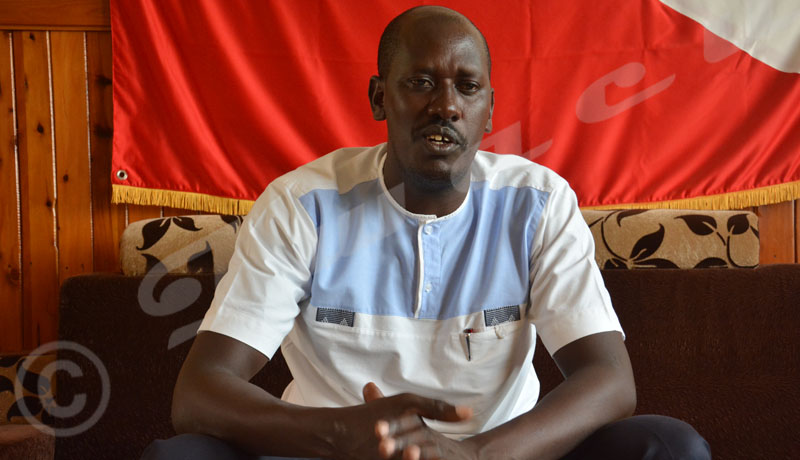 For Abel Gashatsi, president of UPRONA party, it is a feeling of satisfaction because his party was considered for the post of vice-president of the Republic. According to him, UPRONA contributes to the smooth running of the country’s institutions. Mr. Gashatsi believes that the two personalities nominated are people known in the country, with experience and both have already held higher positions in previous years.
For Abel Gashatsi, president of UPRONA party, it is a feeling of satisfaction because his party was considered for the post of vice-president of the Republic. According to him, UPRONA contributes to the smooth running of the country’s institutions. Mr. Gashatsi believes that the two personalities nominated are people known in the country, with experience and both have already held higher positions in previous years.
For UPRONA party, these two personalities will help the President of the Republic to implement the program for which he was elected. Besides, Mr. Gashatsi believes that he can also draw inspiration from the other programs of other parties that match with his program.
He hopes that the next government will encourage the return of all the refugees, the re-establishment of good relations with other countries and the boosting of the economy. Asked if his party will have ministers in the next government, Mr. Gashatsi believes that everything will depend on the will of the president. “With the new Constitution, the president has the latitude to appoint whoever he wants in his government. So, we will be delighted that he appoints a member of UPRONA as minister.”
Biography of Alain Guillaume Bunyoni
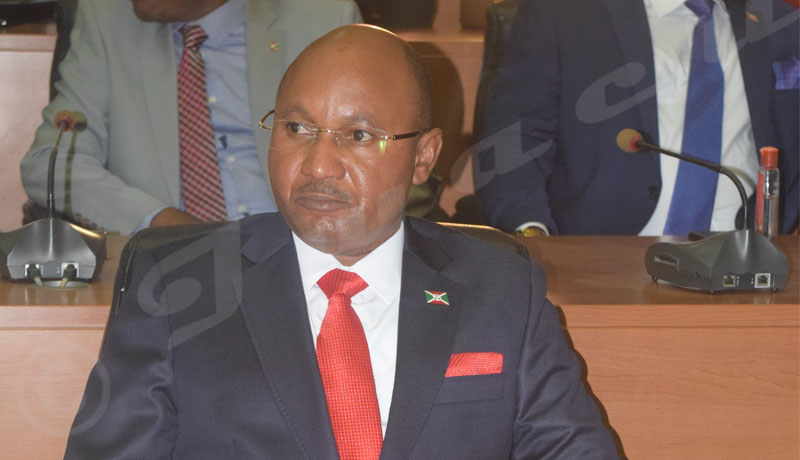 The General Police Commissioner (CPG) Alain-Guillaume Bunyoni was born in 1972 in Kanyosha commune of Bujumbura province. After his primary schooling between 1978 and 1984 at Kanyosha primary school, he continued his secondary studies successively at the Lycée Rohero (1985-1990) and Lycée de Rutovu (1990-1993). The following year, Alain-Guillaume Bunyoni entered the University of Burundi, but could not graduate and joined the CNDD rebel movement. He resumed studies after the cease-fire in November 2003 and obtained a higher diploma issued by the Emmaüs Biblical School.
The General Police Commissioner (CPG) Alain-Guillaume Bunyoni was born in 1972 in Kanyosha commune of Bujumbura province. After his primary schooling between 1978 and 1984 at Kanyosha primary school, he continued his secondary studies successively at the Lycée Rohero (1985-1990) and Lycée de Rutovu (1990-1993). The following year, Alain-Guillaume Bunyoni entered the University of Burundi, but could not graduate and joined the CNDD rebel movement. He resumed studies after the cease-fire in November 2003 and obtained a higher diploma issued by the Emmaüs Biblical School.
Following the signing of the cease-fire in November 2003 between the CNDD-FDD rebel movement and the Transitional government, Alain-Guillaume Bunyoni was appointed between 2004 and 2005 coordinator of the integrated General Staff of the National Police.
From 2005 to 2007, Bunyoni became Director General of the National Police. He was also appointed Minister of Public Security between November 2007 and November 2011 and held the same position from August 2015 until his approval as Prime Minister.
General Bunyoni was chief of the civil cabinet to the President of the Republic from November 2011 to November 2014 and permanent secretary of the National Security Council from November 2014 to August 24, 2015.
The new Prime Minister was from 2007 until 2009 president of the Council of Ministers of the member states of the Regional Center on Small Arms (RECSA) within the framework of the Nairobi Declaration and Protocol on Small Arms and Light Weapons.
Biography of Prosper Bazombanza
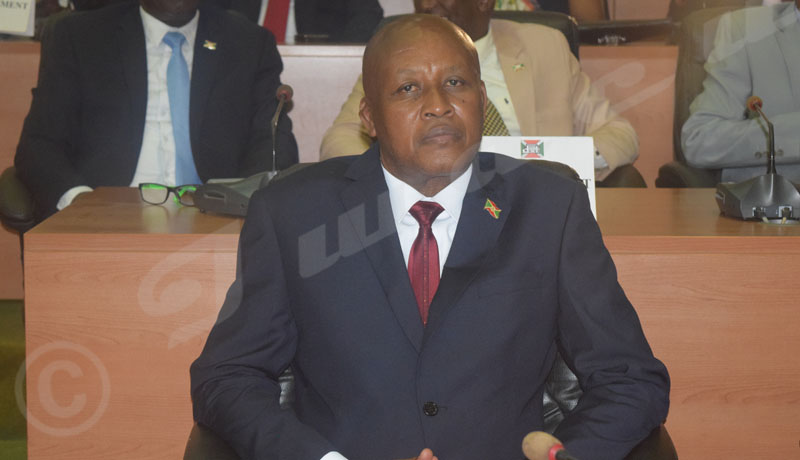 The Vice-President of the Republic, Prosper Bazombanza, was born in Rusaka, Mwaro province, in 1960. He did his primary studies, from 1966 to 1973, at the Official Primary School in Mwaro before entering Ecole normale de Garçons de Gitega. In 1982, he joined the University of Burundi in the Faculty of Applied Sciences. Prosper Bazombanza is a civil engineer in Electromechanical Engineering (University of Burundi, 1990).
The Vice-President of the Republic, Prosper Bazombanza, was born in Rusaka, Mwaro province, in 1960. He did his primary studies, from 1966 to 1973, at the Official Primary School in Mwaro before entering Ecole normale de Garçons de Gitega. In 1982, he joined the University of Burundi in the Faculty of Applied Sciences. Prosper Bazombanza is a civil engineer in Electromechanical Engineering (University of Burundi, 1990).
Former teacher of Mathematics at Lycée Mwaro (1989-1990 and 1992-1997), head of the Equipment maintenance service at the coffee washing stations of SOGESTAL Kirimiro (1990-1992), he was Governor of the Mwaro province (2002-2005), then from 2005 to 2010, member of the provincial coordination of vocational education in Mwaro.
From 2010 to 2014, he was a member of the National Commission for Land and other Properties (CNTB) in the provinces of Rutana, Cankuzo, Ruyigi and Bujumbura. As an activist of UPRONA party, he became from 2014 to 2015 the first Vice President of the Republic of Burundi.
From April 2016 to December 2017, he was appointed Director General of the National Social Security Institute (INSS). Since December 2017, he was Secretary General of the Insurance Regulation and Control Agency (ARCA).
What awaits the Prime Minister?
The May 2018 Constitution contains various articles specifying the tasks of the Prime Minister:
Article 129
The Prime Minister is the Head of Government.
Article 130
Government activities are coordinated by a Prime Minister appointed by the President of the Republic, after prior approval of his candidacy by the National Assembly and the Senate voting separately and by an absolute majority of their members.
The Prime Minister must have the Burundian nationality.
Article 131
The Prime Minister takes decisions by decree. He takes all the measures for the execution of presidential decrees. The Ministers responsible for their execution countersign the Prime Minister’s orders.
Article 132
The Prime Minister and the Ministers are jointly responsible to the President of the Republic.
The resignation of the Prime Minister entails that of the entire Government.
What about the Vice-president of the Republic?
Article 122
In the exercise of his functions, the President of the Republic is assisted by the Vice-President of the Republic.
Article 123
The Vice-President is appointed by the President of the Republic after prior approval of his candidacy by the National Assembly and the Senate voting separately and by an absolute majority of their members. He is chosen from among the elected representatives and must only have the original Burundian nationality.
He may be removed from office by the President of the Republic.
Article 124
The President of the Republic and the Vice-President belong to different ethnic groups, political parties and political party coalitions or are independents of different ethnicities.
Article 125
The President of the Republic may, by decree, delegate the Vice-President of the Republic to chair the Council of Ministers on a specific agenda.
If the Vice-President of the Republic is unable to make it, the President may, by decree, confer this delegation to the Prime Minister.
Illumination on the prerogatives of the outgoing Parliament
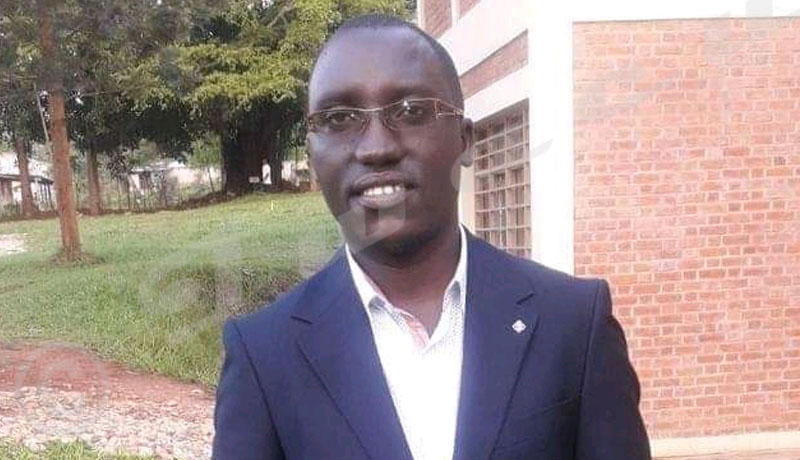 Asked before which Parliament the government will be sworn in, the academic Alexis Manirakiza explains that ” if the elected president puts in place the government before the official establishment of the new Parliament, the president could rely on article 288, paragraph 1 which stipulates that ” the institutions of 2005 remain in place until the definitive establishment of new institutions from the Constitution of 2018 “.
Asked before which Parliament the government will be sworn in, the academic Alexis Manirakiza explains that ” if the elected president puts in place the government before the official establishment of the new Parliament, the president could rely on article 288, paragraph 1 which stipulates that ” the institutions of 2005 remain in place until the definitive establishment of new institutions from the Constitution of 2018 “.
Professor Manirakiza says the government will be sworn in before the Parliament resulting from the old Constitution, as long as that resulting from the Constitution of 2018 is not yet definitively established.
He adds: “It seems contradictory, but it is provided for in the Constitution of 2018 in its article 288.”
Translated into English by Pierre Emmanuel Ngendakumana



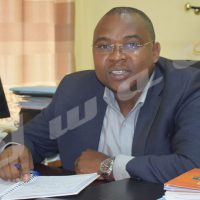
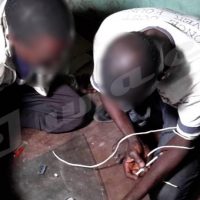











 IWACU Open Data
IWACU Open Data

